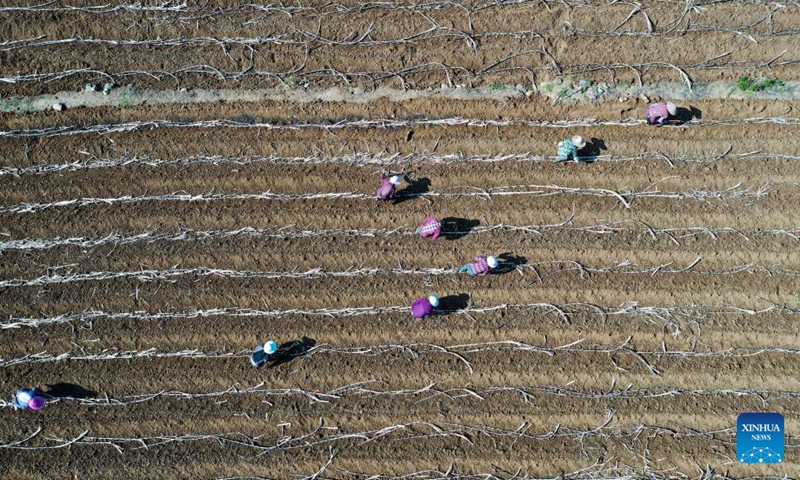India’s sugar export restriction produces no impact on China’s domestic supply: experts

Aerial photo shows farmers working in the sugar cane fields in Dahua Township of Dahua Yao Autonomous County, south China's Guangxi Zhuang Autonomous Region, April 8, 2022.Photo:Xinhua
India's recent decision on sugar export restriction will have no substantive impact to the Chinese market as the country is ramping up the proportion of self-production while diversifying the sources of supplies in an effort to reduce the potential risks of heavy reliance on any particular country, experts said.
For the first time in six years, the world's biggest sugar producer and the second biggest exporter behind Brazil is planning to restrict sugar exports to prevent a surge in domestic prices, according to media reports, the Economic Times reported on Tuesday, citing the country's ministry officials.
"The government wants to monitor the exports so that they do not cross the magical figure of 10 million tons," Atul Chaturvedi with Shree Renuka Sugars, the country's major producer of raw sugar, said, according to the report.
While the latest move immediately hitting the headlines, domestic experts assured that the export ban, if taking place, will bring no impact to Chinese market supplies.
"The export restriction is to stabilize the price of sugar in the country, which has little impact on China and will not affect sugar imports since this part of the gap will be easily filled by increasing the import volume of Brazil and other countries," a senior industry expert told the Global Times on Wednesday on condition of anonymity.
China is the largest sugar consumer and major importer, although India is a major sugar exporting country in the world, it accounts for a small proportion - only 1.83 percent in China's total sugar imports, while there are other import channels as well, mainly from Brazil, accounting for up to 82 percent of the total imports, the expert said.
Soaring inflation resulted from some countries' easy monetary policy since the outbreak of the global pandemic, with global food prices hitting a record over last months, Ma Wenfeng, a senior analyst at the Beijing Orient Agribusiness Consultancy, told the Global Times on Wednesday, talking about the possible reasons behind the export ban.
"These countries prohibit the export of food to prioritize domestic supply so as to ensure their own food security," Ma said. He said that their moves will unlikely impact China's food supply given its sufficient supply, whereas a bumper harvest for summer grains is expected in China thanks to effective policy support.
The latest move came as Mumbai recently bans wheat export as its domestic prices hit a new high. Such a trend of export ban is setting a concerning example for others to follow, further tightening the global food supplies and posing shortages, and may drive up the food prices, experts said.
As of mid-May, a total of 20 countries have implemented grain export bans in the world, and the export bans of these countries involve a wide range of food categories ranging from sugar and wheat to palm oil, further intensifying the supply shortage after the Russian-Ukrainian conflicts, according to media reports.
By diversifying import channels, the chance of being stuck by others' export bans can be greatly reduced, experts said.
At present, China's per capita grain (production) share reaches 483 kilograms, which is significantly higher than the internationally recognized safety line of 400 kilograms, Xi Yinsheng, a senior industry analyst with the Research Center for Rural Economy, Ministry of Agriculture and Rural Affairs, told the Global Times.
While it should also be noted that prices may be affected as global food prices rise, they mainly involve feed grains such as soybeans rather than rations, the expert said.

